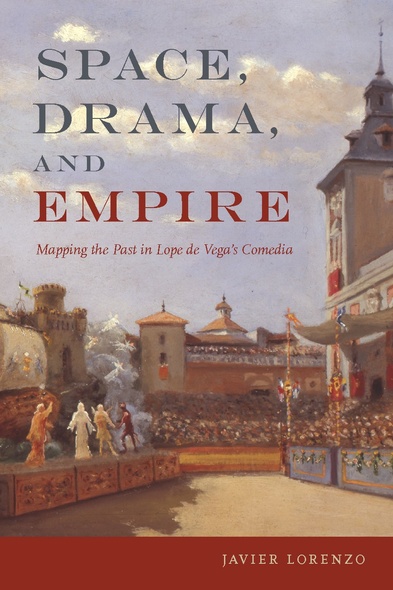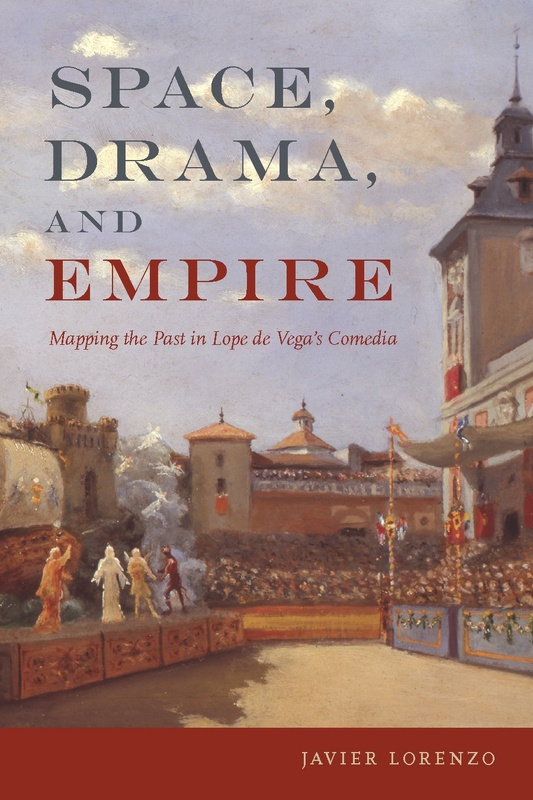
202 pages, 6 x 9
1 color photograph and 4 B-W photographs
Paperback
Release Date:15 Sep 2023
ISBN:9781684484911
Hardcover
Release Date:15 Sep 2023
ISBN:9781684484928
Space, Drama, and Empire
Mapping the Past in Lope de Vega's Comedia
Bucknell University Press
Spanish poet, playwright, and novelist Félix Lope de Vega (1562–1635) was a key figure of Golden Age Spanish literature, second only in stature to Cervantes, and is considered the founder of Spain’s classical theater. In this rich and informative study, Javier Lorenzo investigates the symbolic use of space in Lope’s drama and its function as an ideological tool to promote an imagined Spanish national past. In specific plays, this book argues, historical landscapes and settings were used to foretell and legitimize the imperial present in Hapsburg Spain, allowing audiences to visualize and plot, as on a map, the country’s expansionist trajectory throughout the centuries. By focusing on connections among space, drama, and empire, this book makes an important contribution to the study of literature and imperialism in early modern Spain and equally to our understanding of the role and political significance of spatiality in Siglo de Oro comedia.
A fascinating and original study of space showing how theater has the unique potential to function as the ultimate vehicle to explore and, more importantly, complicate matters of our past.
An eye-opening examination of Golden Age theater focusing on how Lope de Vegas’s plays use symbolic and ideological space, prefigure an imperial present (and future), and legitimize imperial expansion and territorial appropriation.
Lorenzo offers a wealth of insights to better understand a corpus of plays that Lope de Vega devised from the heights of artistic sophistication and popular acclaim. Lorenzo’s vivid, clear analysis retraces Lope’s steps as he reworks chronicles, myths, and maps depicting Iberia’s patchwork medieval realms for his own times, with a keen eye and well-tuned ear on the imperatives of Spain’s diverse, far-flung empire. Space, Drama, and Empire is a boon for scholars and students alike.
Lorenzo’s analysis of the representation of geographical space in Lope’s historical dramas provides compelling new insights concerning the reconfiguration of iconic episodes from Spain’s medieval past as imperial or proto-imperial episodes. Of particular interest is the way that Lorenzo identifies absolutist and imperialist undertones in plays that feature the peripheral provincial settings of Galicia, Asturias, and Las Canarias as prefigurations of early modern colonialism.
Lope used Spanish history to project the aims and the armaments of imperial Spain, tying history to geography... Lorenzo demonstrates how Lope reappropriated medieval texts, testimonies, myths, and maps in order to connect them to the ideology and the aspirations of empire. Lorenzo profits from the current interest in the study of space, and he offers key analyses of Lope’s singular vision. The comprehensive field of cultural studies has opened doors to the investigation of literary and dramatic works, and Lorenzo builds upon the research and the commentaries of his predecessors as he observes and attempts to decipher Lope’s particular sensibility. The presentation and the evaluations are clear and well written, and the arguments are sound and original.'
JAVIER LORENZO is an associate professor of Hispanic studies at East Carolina University in Greenville, North Carolina. He is the author of Nuevos casos, nuevas artes: Intertextualidad, autorrepresentación e ideología en la obra de Juan Boscán.
List of Illustrations
A Note on Translations
Introduction
Acknowledgments
Bibliography
Index
A Note on Translations
Introduction
- Space and the Imperial Appropriation of the Past in the Lopian comedia
- “Que los reyes nunca están lejos”: Empire and Metatheatricality in El mejor alcalde, el rey
- Born to Expand: Space, Figura, and Empire in Las famosas asturianas
- Endangered from Within: Space and Difference in Las paces de los reyesy judía de Toledo
- Atlantic Conquests, Transatlantic Echoes: Space, Gender, and Dietetics in Los guanches de Tenerife y conquista de Canaria
Acknowledgments
Bibliography
Index







